Redditor Gets Sued By Her Ex For Trying To Keep A Dog They Both Got When They Were Still Dating
There are numerous reasons behind breakups. Some causes are outside of your control, such as when one of you moves away, when you attend different institutions, or when you undergo a lifestyle change that alters how you prioritize your relationships.
Other explanations are more related to internal changes; perhaps you feel as though you have drifted apart or are developing in different directions. Relationships can occasionally be unhealthy for one or both parties.
A relationship may end amicably or may need to conclude to protect the mental health and well-being of either party or both. However, it can be more challenging when there's a pet involved, and it must go with one person.
Regardless of your feelings, you must first realize that pets are not people or children; they are pieces of property. As a result, dogs are distributed similarly to other property and typically do not have visitation or child support requirements like real children do.
Meet Redditor [deleted], who bought a dog together with her boyfriend, but they eventually broke up. The OP asked him to let the dog stay with her so that she would be less stressed, and he agreed.
The whole time, the OP made it clear that the dog was hers since he suddenly left the life they were building together, but he kept insisting that he also owned the dog and that they should share. One thing led to another, and the dog ownership issue landed in court.
Keep scrolling to read the full story.
The headline...

The OP tried to work it out with him for a while

The OP was clear that it was her dog

Navigating Shared Assets in Relationships
Disputes over shared assets, such as pets, often reflect deeper relational issues, including trust and respect. Research published in the Journal of Social and Personal Relationships indicates that disagreements over shared responsibilities can lead to significant emotional distress. Establishing clear guidelines for shared assets can help mitigate conflicts and promote healthier dynamics.
Engaging in open conversations about expectations and responsibilities can foster mutual understanding among individuals navigating these complexities.
The Emotional Weight of Pet Ownership
This situation sheds light on the emotional complexities surrounding pet ownership and shared responsibilities. According to Dr. John Archer, a psychologist who studies human-animal relationships, pets often represent significant emotional investments for their owners.
When relationships end, the division of shared pets can evoke feelings of betrayal and loss, complicating the emotional landscape.
Understanding these dynamics is essential for navigating conflicts related to shared pet ownership.
The OP felt so betrayed

He claims he did the majority of the dog's care
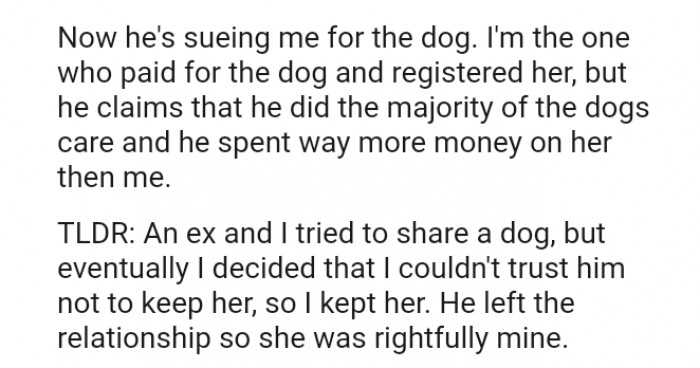
Breakups are awful, regardless of what leads to them or whether you want to end a relationship. When you initiate a breakup while the other person doesn't want to, you may experience sadness, remorse, and dread.
In a straightforward divorce, the individual who purchased the dog typically retains ownership. The only exception is if the dog was purchased as a gift for the other partner.
In that situation, the dog might belong to the recipient, but this is a different story, and here is what Redditors had to say.
In the US, dogs are generally considered property

Additionally, the emotional implications of losing a shared pet can be profound, especially when trust has been breached in the relationship. Studies show that pets often serve as emotional support and companionship, making disputes over their care particularly sensitive. Recognizing the emotional value of shared assets can facilitate healthier discussions about responsibilities and ownership.
Encouraging empathy and understanding during these conversations can create a more supportive atmosphere for both parties involved.
Research in family psychology indicates that pets can serve as attachments similar to those formed with human relationships. When a pet is involved in a breakup, it can lead to intense emotional responses, including grief and anger.
Recognizing the deep emotional bonds individuals have with their pets can help facilitate more compassionate discussions about custody.
Understanding these dynamics can guide individuals toward healthier resolutions.
This Redditor can't decide from the story alone
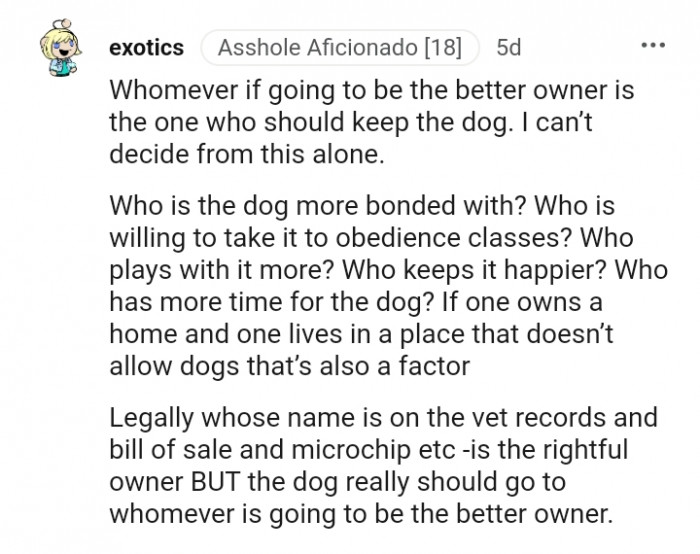
This is not about the dog

It does not mean the dog is yours

The Role of Trust in Relationship Conflicts
Trust is a foundational element in any relationship, and breaches of trust can lead to significant relational turmoil. Research indicates that individuals often struggle to navigate conflicts when trust has been compromised. Engaging in therapeutic approaches, such as couples therapy, can help partners rebuild trust and facilitate better communication.
Establishing clear boundaries and expectations can also enhance trust and understanding, promoting healthier interactions moving forward.
The Importance of Clear Agreements
Establishing clear agreements about pet care and ownership can mitigate disputes during relationship transitions. Research suggests that prenups or cohabitation agreements can include clauses about pet custody, helping to clarify expectations.
Having these discussions before conflicts arise can foster a sense of fairness and mutual respect.
Open communication about responsibilities can lead to healthier outcomes for both parties.
You remain in your former home so the dog will have stability
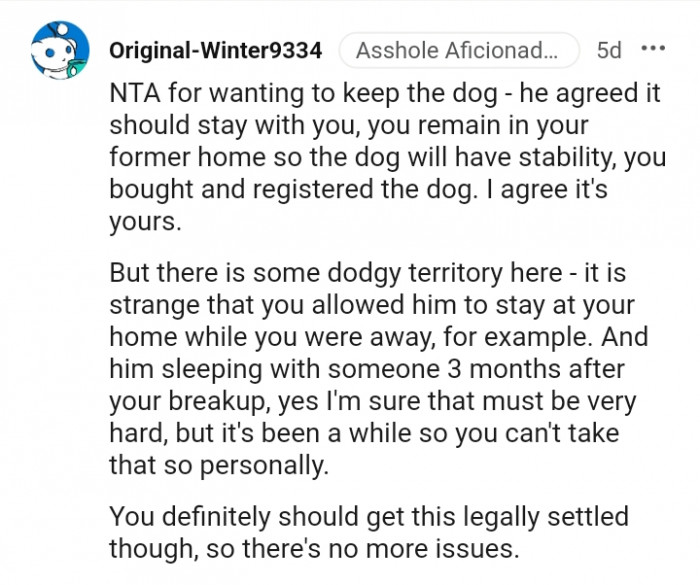
This Redditor would consider who would take care of the dog
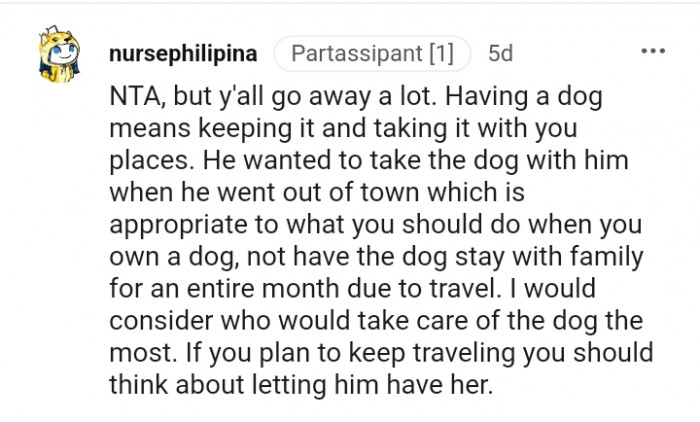
Regarding the dog ownership, the OP is not at fault

Furthermore, the emotional fallout from disputes over shared assets can lead to long-lasting resentment and conflict. Understanding each other's perspectives and feelings is crucial for resolving these conflicts. Encouraging open dialogues about individual needs and concerns can facilitate healthier communication and promote understanding among partners.
Implementing regular check-ins to discuss feelings and concerns can also help prevent misunderstandings and foster a supportive environment.
From a conflict resolution perspective, understanding each party's emotional attachments and motivations can facilitate more productive discussions.
When emotions run high, approaching the conversation with empathy and a willingness to understand can lead to better outcomes.
Practicing active listening during these discussions can help both parties feel heard and valued.
You're keeping the dog to yourself for the dog's well-being
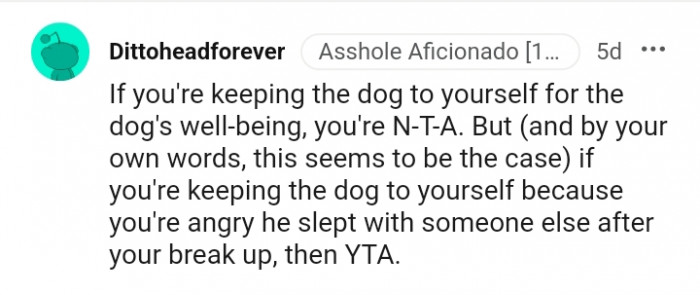
You don't trust him because he hurt you
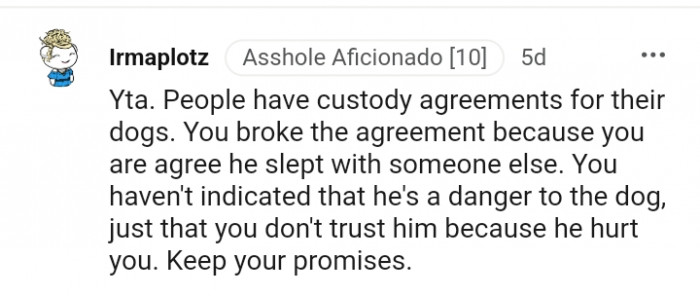
A breakup may result in hurt and feelings of rejection. Even when both parties agree to leave the relationship, it's common to temporarily experience uncomfortable feelings.
But when a pet is involved, it's another story altogether. Please leave your thoughts about this story in the comments below and share this post as well.
Recommendations for Navigating Pet Custody Disputes
To navigate disputes over pet custody, individuals should prioritize open communication and empathy. Engaging in discussions about pet care responsibilities can help clarify expectations and reduce misunderstandings.
Additionally, involving a neutral third party, such as a mediator, can provide an objective perspective on the situation.
Creating a structured visitation plan can also promote a sense of fairness and cooperation.
Seeking therapeutic support can also benefit individuals navigating complex emotions related to pet custody. Research published in the Journal of Family Psychology indicates that therapy can be effective in processing emotional responses and developing healthier coping strategies.
Therapeutic interventions can provide individuals with tools to manage their feelings and foster healing.
Ultimately, empathy and understanding are key to resolving these disputes amicably.
Psychological Analysis
This situation highlights the emotional significance of pets in our lives and the complexities that can arise during relationship transitions. Open communication and empathy are vital in addressing the emotional nuances of shared pet ownership.
Analysis generated by AI
Analysis & Alternative Approaches
Understanding the emotional complexities of pet ownership is essential for navigating shared custody disputes. Research consistently supports the importance of clear communication and empathy in resolving conflicts.
By fostering open dialogue and mutual respect, individuals can navigate these challenges more effectively and create healthier outcomes.
Analysis & Alternative Approaches
Overall, navigating disputes over shared assets requires careful consideration of emotional dynamics and open communication. Psychological research consistently emphasizes the importance of understanding perspectives and fostering collaboration in resolving conflicts. By prioritizing empathy and clear communication, individuals can navigate these challenges more effectively and create healthier relationships.



